Participation in the Western Cape Climate Change Response Forum: Opportunities for Large Scale Ecosystem-based Adaptation in the Western Cape
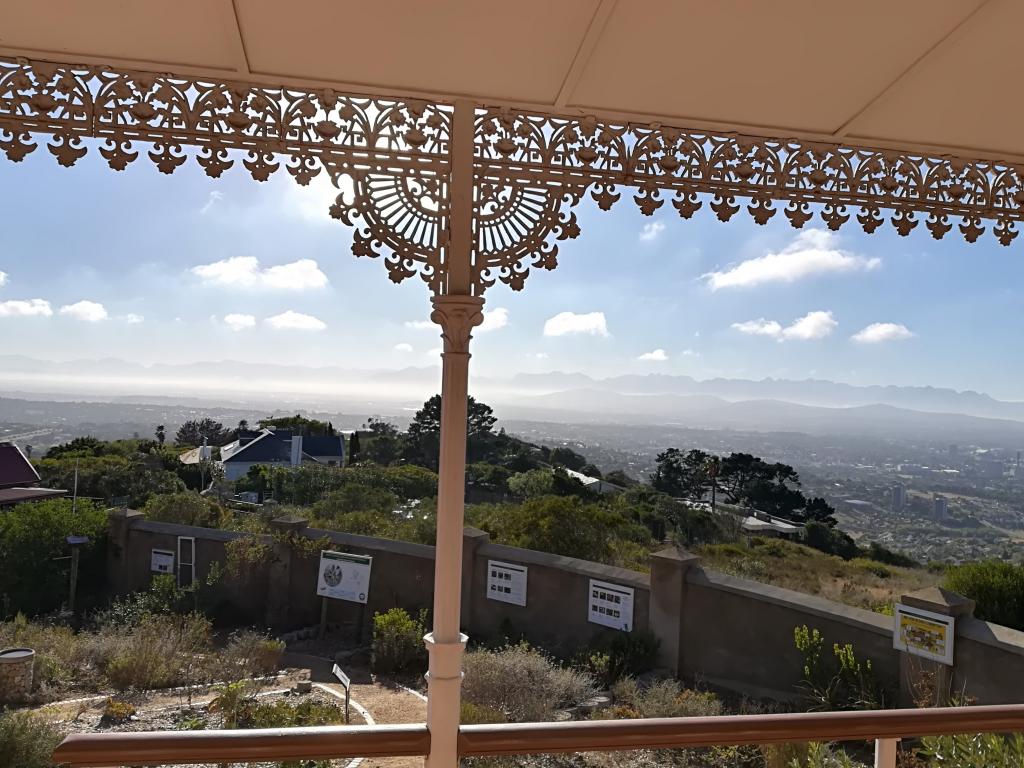
Ecosystem-based Adaptation (EbA) is defined as a sustainable development approach that uses biodiversity and ecosystem services (ES) as part of an overall strategy to help people adapt to the negative effects of climate change, resulting in socio-economic and ecosystem conservation benefits (CBD 2009). One way for the Cape Floristic Region (CFR), and South Africa at large, to manage ES in light of climate change impacts is through an approach such as EbA. The CFR comprises conservation and agricultural landscapes that provide essential attributes of ecological systems, known as ES (e.g. such as biodiversity, water regulation and soil erosion regulation), upon which societies depend. Therefore, ES play a critical role in food and water security, economic development and overall resilience.
On 27 February 2018, Cherié Forbes, a doctoral candidate at the Plant Conservation Unit at the University of Cape Town (UCT), attended the Western Cape Climate Change Response Forum: An initiative under Provincial Strategic Goal 4. The meeting was co-hosted by the Department of Environmental Affairs and Development Planning (DEA&DP) and the African Climate and Development Initiative (ACDI) based at UCT. The aim of this particular meeting was to enhance our understanding of the practical application of EbA in the Western Cape and to identify opportunities for large scale landscape wide programmes.
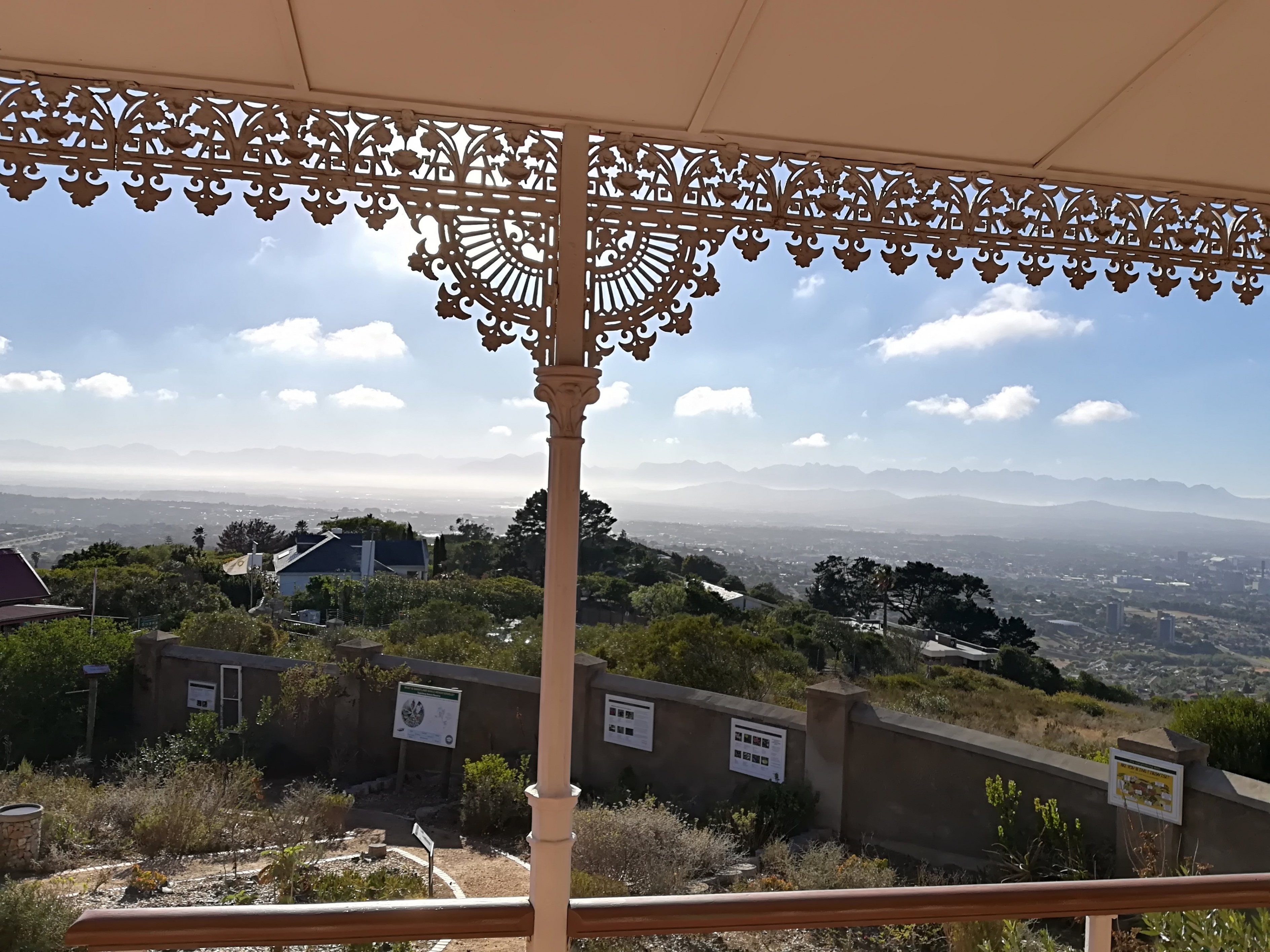
View from the Kristo Pienaar Environmental Education Centre (KPEEC, Tygerberg Nature Reserve) where the Western Cape Climate Change Response Forum was held on 27 February 2018. The KPEEC contains a resource centre with a library and a herbarium. Lessons on a variety of topics, including biodiversity and ecology, are taught to school learners, university and college students.
The Forum took place at Tygerberg Nature Reserve in Cape Town where over 50 participants from various local organisations and institutions gathered to reflect and discuss the policy and practice of EbA. The half-day workshop consisted of a number of presentations from several institutions (DEA, South African Biodiversity Institute, Council for Scientific and Industrial Research, City of Cape Town, Western Cape Provincial Government, SmartAgri) which provided an overview of the policy context of EbA and how it relates to existing Western Cape policy as well as examples of EbA implemented in many contexts: urban, rural, coastal, agricultural, multi-stakeholder, etc. These presentations were the backdrop for a plenary discussion where attendees could share ideas and views on what EbA related activities should be prioritised for the Western Cape and how we could leverage opportunities for potential large scale EbA programmes in the Western Cape.
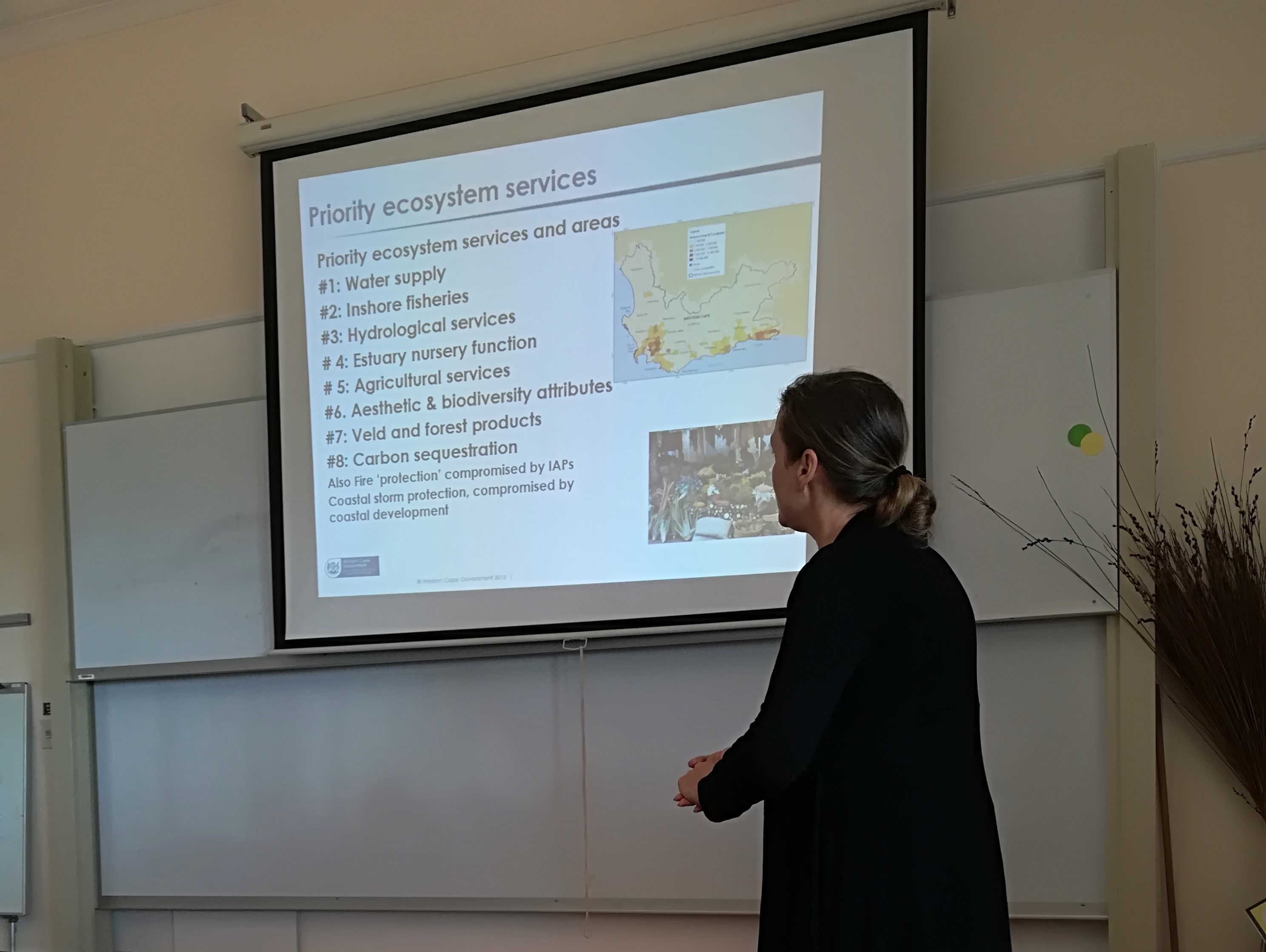
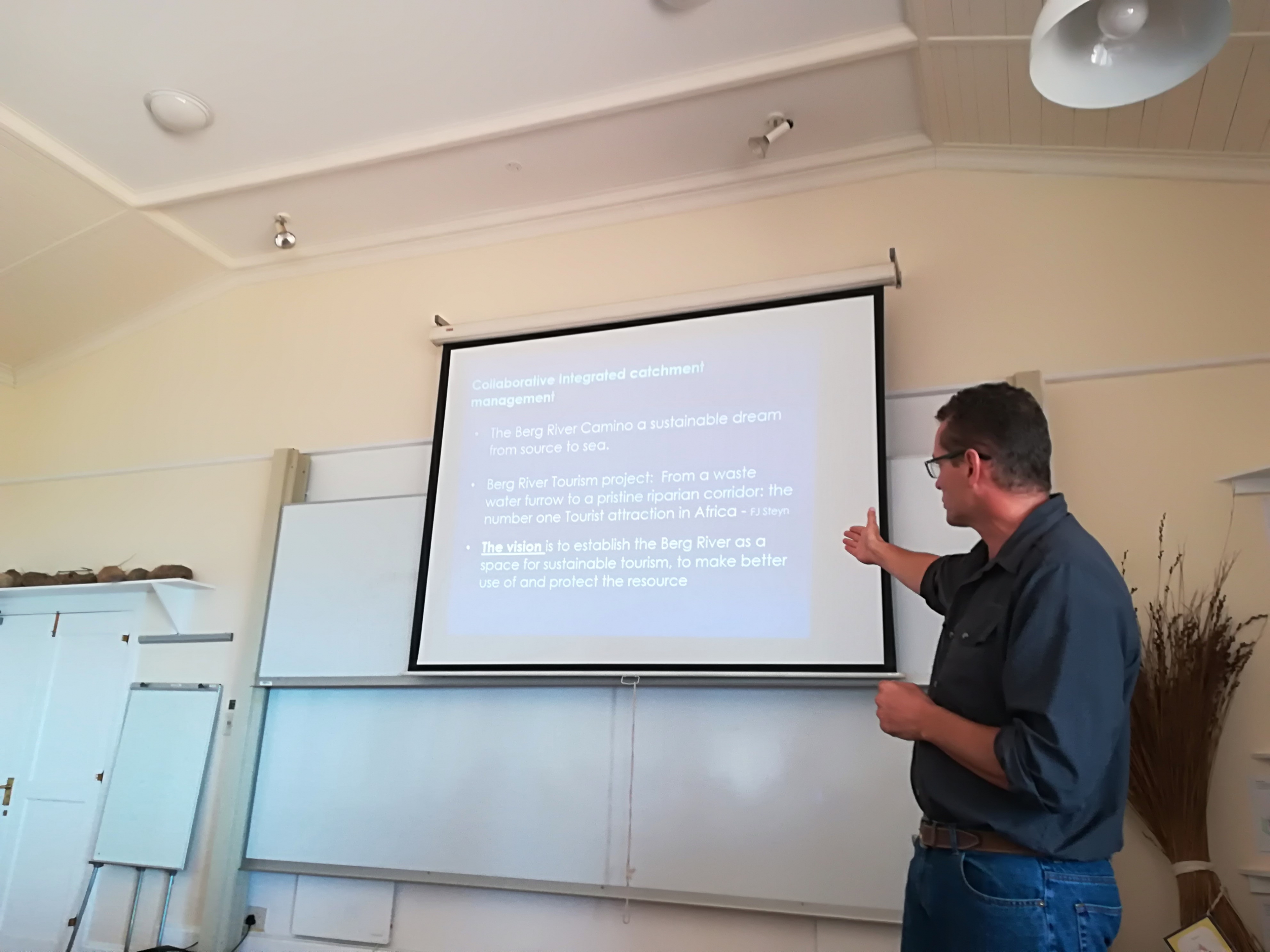
Presentations by various institutions laid the foundation of the workshop by providing an overview of the policy context of EbA and sharing examples of EbA implementation in the Western Cape. From left to right: Marlene Laros (Western Cape Department of Environmental Affairs and Development Planning), Rudolph Roscher (Western Cape Department of Agriculture).
Some important consequences of linkages and synergies
Cherié felt that the Forum was the perfect opportunity for her to learn more about the concept of EbA, especially how various stakeholders within the Western Cape relate to EbA and carry it out practically in their work and research; and how the topic of her PhD research fits into the regional and national context. What was particularly important about this Forum was that it created an opportunity for a multi-stakeholder group to identify linkages and synergies within existing climate change adaptation efforts as well as identify the potential for future collaboration efforts across institutions. Such efforts are important for ensuring coherence and coordination of an approach to sustainable development (which is what EbA is) that contributes to three outcomes simultaneously: socio-economic benefits, climate change adaptation and biodiversity conservation. A level of coordination and collaboration is especially important if we want to respond to large scale funding opportunities. For example, one opportunity of which an EbA project/programme would be eligible for funding is via the Green Climate Fund (GCF)[1] which is a relatively new global fund that was created in 2010 to support the efforts of developing countries to respond to the challenge of climate change.
Furthermore, Cherié is excited about a recent collaboration opportunity which was sparked by one of the presentations given on the day by LandCare Manager, Rudolph Roscher. The presentation pertained to various Conservation Agriculture activities which have positive impacts on ecological infrastructure, in this case the Berg River and Brede River. A few weeks after the Forum, Cherié had a follow-up meeting with Rudolph and Elmo Maree (LandCare Chief Industrial Technician) from the Western Cape Department of Agriculture to share her PhD research approach, which aims to:
- use applied palaeoecology and systems dynamics modelling to investigate the long-term influence of climate change and land-use on ES dynamics;
- explore management implications and policy recommendations for future biodiversity conservation, sustainable agriculture and climate change adaptation (i.e. an EbA approach).
Since the Western Cape Department of Agriculture have an existing long-term relationship with private land-owners in the region (Wellington District Municipality) there is scope to align some of her research efforts with their existing stakeholder engagement efforts. In particular, Cherié is looking forward to engaging (via semi-structured interviews and systems dynamics workshops) with local government and the commercial farmers who are members of the Agter-Groenberg Renosterveld Conservancy in the upcoming months of her PhD. The Conservancy has been in operation since 2002 when it was constituted by CapeNature as a voluntary agreement between landowners in the Agter-Groenberg region of Wellington. It was founded by Frank Turner of Bontebok Ridge Reserve with the aim of combining the conservation efforts of neighbours, begin the onerous task of clearing alien invasive vegetation to improve water flow, promote natural biodiversity as well as to encourage sustainable management of the environment.
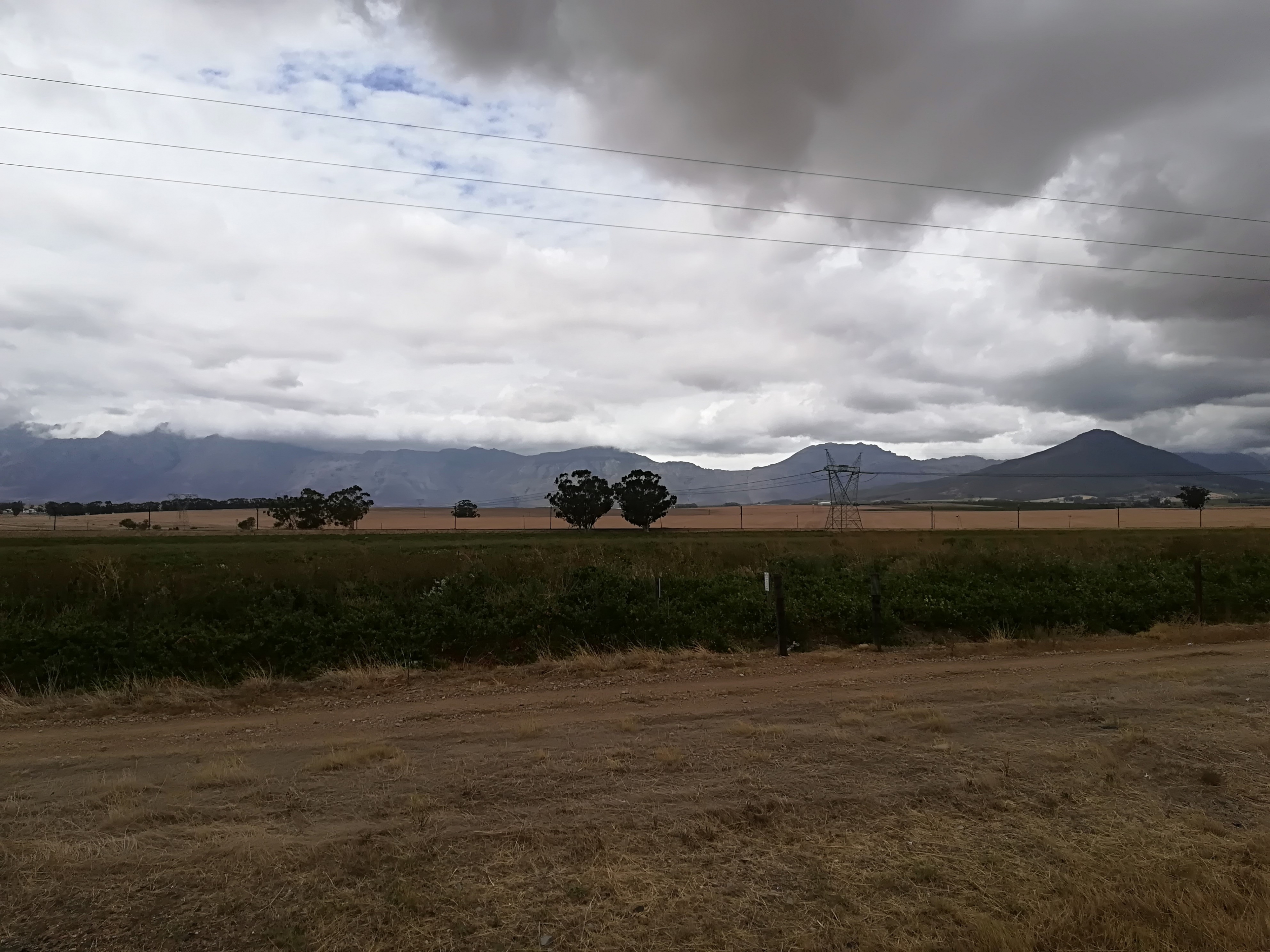
Partial view of and the Agter-Groenberg Renosterveld Conservancy which consists of 17 landowners with farms and nature reserves at the foothills of the mountain. The Conservancy stretches north from the Groenberg Mountain (far right ‘koppie’) to the Voelvlei Dam.
~ Article and images supplied by Cherié Forbes
[1] The Green Climate Fund was established by decision of UNFCCC COP 15 to scale up climate finance funding by raising USD 100 billion a year by 2020. To date, just under USD 9 billion has been raised by the Fund, for both mitigation and adaptation activities. The GCF’s vision: To support the implementation of the Paris Agreement in developing countries by (a): enhancing adaptive capacity and fostering resilience and making financial flows consistent with low greenhouse gas emission and climate resilient development; and (b) by making Intended Nationally Determined Contributions the important reference point for the GCF’s programming.
